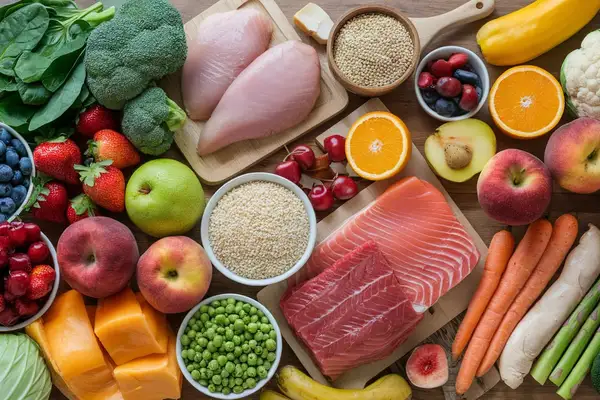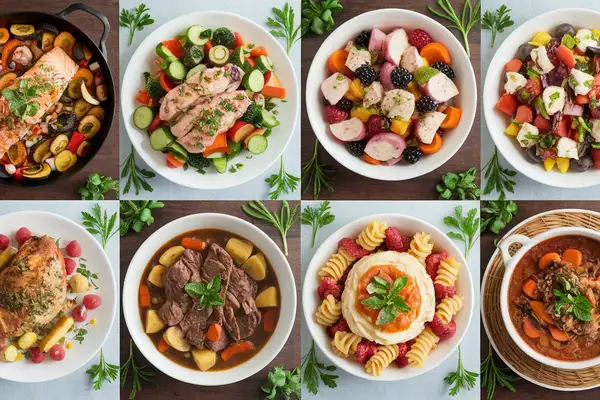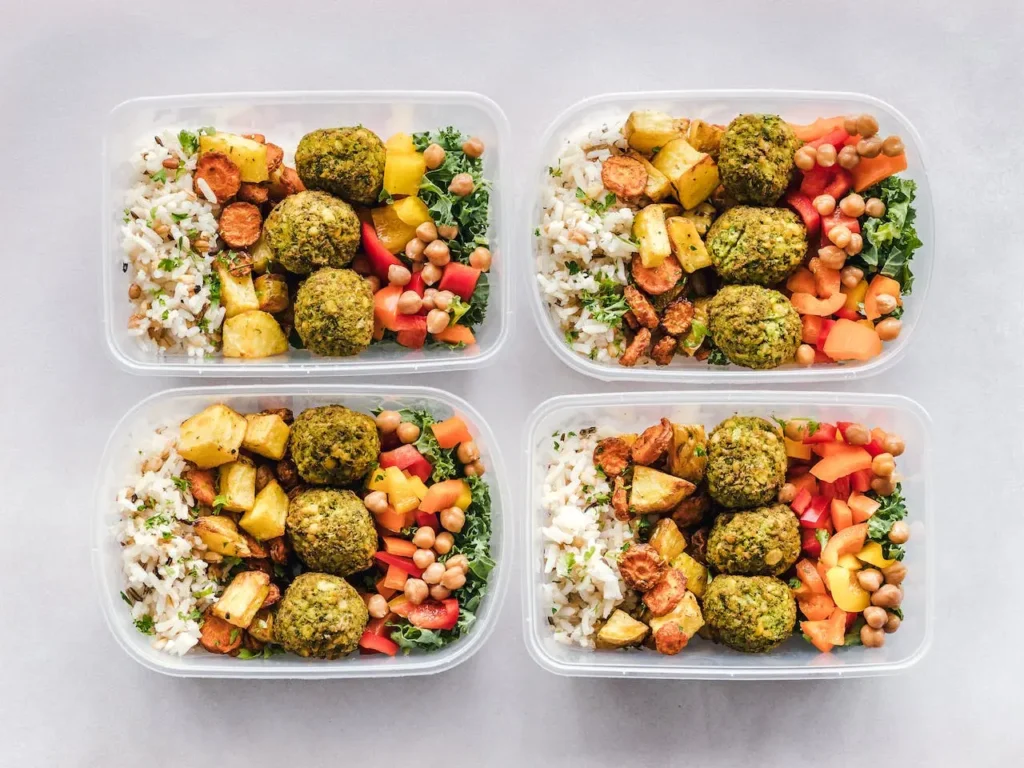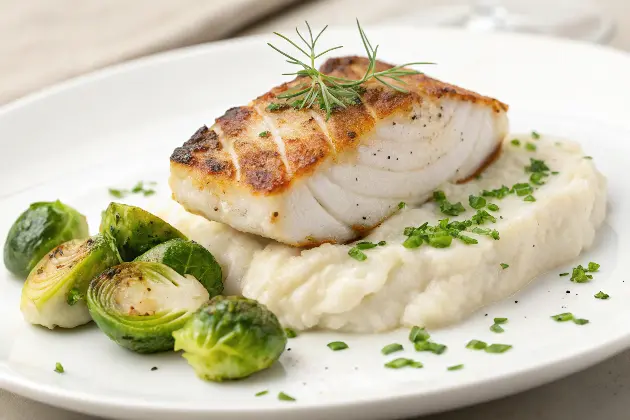7-Day Meal Plan for Osteoporosis: High Calcium Foods List
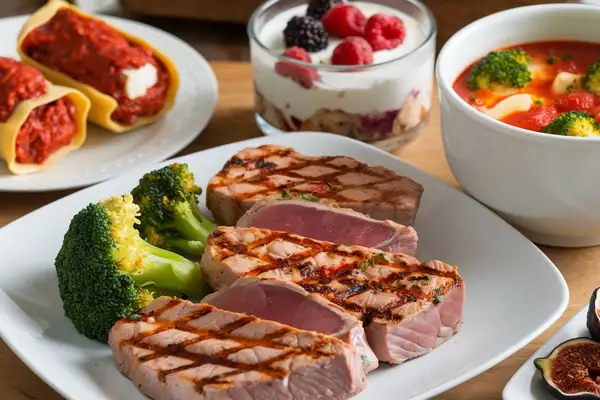
What is Osteoporosis?
This post may contain affiliate links, meaning I may earn a commission if you make a purchase, at no extra cost to you. I only recommend products I trust. Thank you for your support.
Osteoporosis is a condition where your bones become weak and brittle, making them more likely to break.
It’s often referred to as a “silent disease” because you may not know you have it until a fracture occurs.
Thankfully, an osteoporosis diet can play a significant role in improving bone health, bone density, and preventing bone loss.
In this 7-day meal plan for osteoporosis, you’ll find bone strengthening osteoporosis diet recipes filled with key nutrients essential for bone health.
This osteoporosis diet plan features bone healthy foods that are rich in calcium, vitamins K and D, and manganese along with osteoporosis diet menu ideas for the week that will help keep your bones strong and healthy!
What Causes Osteoporosis?
Several factors can contribute to osteoporosis:
- Age: As individuals age, bone resorption (the process of bone breakdown) outpaces bone formation, leading to a decrease in bone density. This is especially pronounced after menopause in women due to decreased estrogen levels.
- Hormonal changes: Hormones, particularly estrogen in women and testosterone in men, play a crucial role in maintaining bone density. After menopause, the decline in estrogen levels significantly increases the risk of osteoporosis.
- Lack of exercise: Lack of physical activity, especially weight-bearing and resistance exercises, can lead to decreased bone density. Regular exercise helps build and maintain strong bones.
- Poor diet: Insufficient bone healthy nutrient intake over a lifetime can lead to lower bone density and increase the risk of osteoporosis.
- Genetics: A family history of osteoporosis can increase the risk, as genetics can influence bone density and the likelihood of fractures.
- Low Body Weight: Individuals with a low body mass index (BMI) or those who are underweight are at a higher risk of osteoporosis, as they may have less bone mass to draw from as they age.
- Certain Medical Conditions: Conditions such as rheumatoid arthritis, hyperthyroidism, and other hormonal disorders can affect bone health and increase the risk of osteoporosis.
Key Nutrients for Bone Health
- Calcium: Calcium is the primary mineral found in bones, providing strength and structure. Adequate calcium intake helps maintain bone density and prevent osteoporosis.
- Vitamin D: Vitamin D aids in calcium absorption and helps regulate calcium levels in the blood. It is crucial for bone remodeling and maintaining bone density.
- Magnesium: Magnesium plays a vital role in converting vitamin D into its active form, which is necessary for calcium absorption. It also helps maintain bone structure.
- Vitamin K: Vitamin K is essential for the synthesis of osteocalcin, a protein that helps bind calcium to the bone matrix. It plays a role in bone mineralization.
- Protein: Protein is crucial for maintaining bone mass and supporting the overall structure of bones. It helps in the formation of bone cells and collagen.
- Phosphorus: Phosphorus works in conjunction with calcium to form bone tissue. It is important for maintaining bone strength and structure.
- Zinc: Zinc is involved in bone growth and development. It helps in the activity of bone-building cells (osteoblasts) and the production of bone matrix.
- B Vitamins: B vitamins, particularly B6, B12, and folate, support bone health by reducing homocysteine levels, which can negatively impact bone density.
7-Day Meal Plan for Osteoporosis (Osteoporosis Menu)
This 7-day meal plan for osteoporosis features foods rich in calcium, vitamin D, magnesium, and vitamin K, essential for maintaining strong and healthy bones.
This osteoporosis diet plan emphasizes whole, nutrient dense bone healthy foods that promote bone density while avoiding foods that could negatively impact bone strength.

Day 1
Breakfast:
- Cinnamon Roll Overnight Oats: Combine oats, almond milk, cinnamon, and Greek yogurt, and refrigerate overnight. (1/2 cup oats, 1 cup almond milk, 1/2 cup Greek yogurt, 1 tsp cinnamon)
Lunch:
- Grilled Sardines with Aioli and Arugula Salad: Grill sardines and serve with aioli and arugula salad. (4 oz sardines, 1 cup arugula, 2 tbsp aioli)
- Tomato Soup with Beans & Greens: Blend tomatoes, add white beans, bok choy, and vegetable broth, and simmer. (1 cup tomatoes, 1/2 cup white beans, 1 cup bok choy, 1 cup vegetable broth)
Dinner:
- Chicken Adobo and Kale Enchiladas: Fill whole wheat tortillas with chicken, kale, and adobo sauce, and bake. (4 oz chicken, 1 cup kale, 2 whole wheat tortillas, 1/4 cup adobo sauce)
Snacks:
- Figs Stuffed with Manchego Cheese: Slice figs and fill with Manchego cheese. (4 figs, 2 oz Manchego cheese)
- Carrot Sticks with Guacamole: Serve carrot sticks with guacamole. (1 cup carrot sticks, 1/4 cup guacamole)
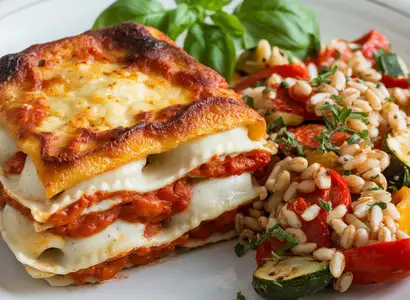
Day 2
Breakfast:
- Bircher Muesli: Mix rolled oats, almond milk, yogurt, and grated apple. Let it sit overnight. (1/2 cup rolled oats, 1/2 cup almond milk, 1/4 cup yogurt, 1 grated apple)
Lunch:
- Linguine with Lemon Alfredo Shrimp: Toss cooked linguine with lemon Alfredo sauce and shrimp. (1 cup linguine, 4 oz shrimp, 1/4 cup Alfredo sauce)
- Potato Broccoli Soup: Blend potatoes and broccoli with vegetable broth and cream. (1 cup potatoes, 1 cup broccoli, 2 cups vegetable broth)
Dinner:
- Skillet Ravioli Lasagna: Cook ravioli, layer with marinara sauce, and sprinkle with Parmesan. (1 cup ravioli, 1/2 cup marinara sauce, 2 tbsp Parmesan)
- Farro Vegetable Salad: Toss cooked farro with roasted vegetables and Jarlsberg cheese. (1 cup farro, 1 cup roasted vegetables, 1/4 cup Jarlsberg cheese)
Snacks:
- Dried Apricots with Almond Butter: Dip dried apricots in almond butter for a sweet and satisfying snack. (1/2 cup dried apricots, 2 tbsp almond butter)
- Papaya with Lime Juice: Slice fresh papaya and drizzle with lime juice for a refreshing treat. (1 cup papaya, juice of 1/2 lime)
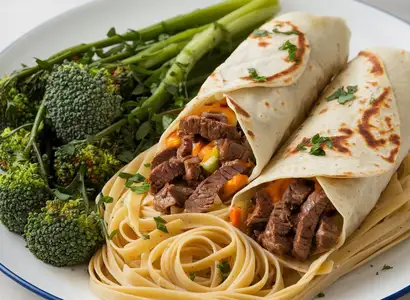
Day 3
Breakfast:
- Huevos Rancheros: Fry eggs, and serve over corn tortillas with salsa and black-eyed beans. (2 eggs, 2 corn tortillas, 1/4 cup black eyed beans, 2 tbsp salsa)
Lunch:
- Shrimp Cobb Salad with Dijon Dressing: Toss shrimp, avocado, hard boiled eggs, and greens with Dijon dressing. (4 oz shrimp, 1/2 avocado, 1 egg, 1 cup greens, 1 tbsp Dijon dressing)
Dinner:
- Zucchini Noodle Primavera: Spiralize zucchini, toss with sautéed vegetables, and sprinkle with Parmesan. (1 zucchini, 1 cup mixed vegetables, 2 tbsp Parmesan)
- Steak Burritos with Broccolini: Fill a burrito with steak and sautéed broccolini. (4 oz steak, 1 cup broccolini, 1 large tortilla)
Snacks:
- Matcha Green Tea: Whisk matcha powder with hot water. (1 tsp matcha powder, 1 cup hot water)
- Sliced Bell Peppers with Hummus: Slice bell peppers and serve with hummus. (1 cup bell peppers, 1/4 cup hummus)
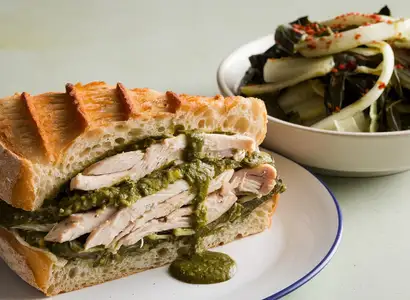
Day 4
Breakfast:
- Avocado with Shrimp: Fill halved avocado with cooked shrimp and a squeeze of lemon. (1/2 avocado, 4 oz shrimp, 1 tsp lemon juice)
Lunch:
- Veggie Cheese Sandwiches: Layer cheddar cheese with veggies in whole grain bread. (2 slices whole grain bread, 1/4 cup cheddar cheese, 1/2 cup mixed veggies)
Dinner:
- Chicken Pesto Panini: Grill chicken, spread pesto on whole wheat bread, and press into a panini. (4 oz chicken, 2 slices whole wheat bread, 2 tbsp pesto)
- Smothered Turnip Greens and Cabbage: Sauté turnip greens and cabbage with garlic and olive oil. (2 cups turnip greens, 1 cup cabbage, 1 tbsp olive oil)
Snacks:
- Blackberries with Greek Yogurt: Serve blackberries topped with a dollop of Greek yogurt. (1 cup blackberries, 1/2 cup Greek yogurt)
- Baked Plantain Chips: Slice plantains and bake until crispy for a crunchy snack. (1 medium plantain, sliced and baked)
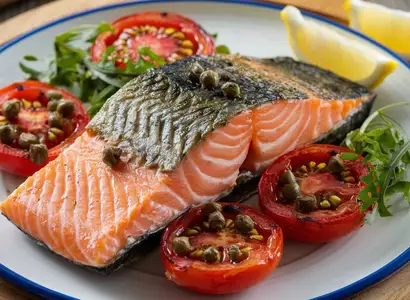
Day 5
Breakfast:
- Cinnamon Roll Overnight Oats: Combine oats, almond milk, cinnamon, and Greek yogurt, and refrigerate overnight. (1/2 cup oats, 1 cup almond milk, 1/2 cup Greek yogurt, 1 tsp cinnamon)
Lunch:
- Grilled Salmon with Tomatoes, Dandelion Greens, and Capers: Grill salmon and serve with tomatoes, dandelion greens, and capers. (4 oz salmon, 1/2 cup tomatoes, 1/2 cup dandelion greens, 1 tbsp capers)
Dinner:
- Spaghetti with Komatsuna Greens sprinkled with Parmesan: Toss spaghetti with sautéed komatsuna greens and sprinkle with Parmesan. (1 cup spaghetti, 1 cup komatsuna greens, 2 tbsp Parmesan)
Snacks:
- Pineapple Banana Smoothie: Blend pineapple, banana, and almond milk for a refreshing smoothie. (1 cup pineapple, 1 banana, 1 cup almond milk)
- Dried Figs and Manchego Cheese: Enjoy dried figs paired with Manchego cheese for a sweet and savory combination. (4 dried figs, 1 oz Manchego cheese)
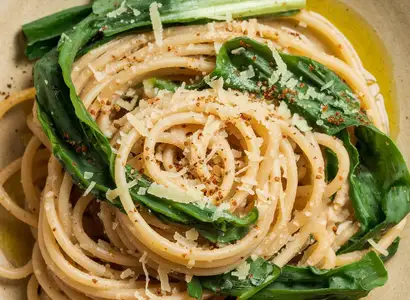
Day 6
Breakfast:
- Citrus Berry Smoothie with Yogurt: Blend yogurt with citrus and mixed berries. (1/2 cup yogurt, 1/2 cup berries, 1 orange)
Lunch:
- White Bean & Avocado Sandwich: Mash avocado, mix with white beans, and spread on whole grain bread. (1/2 avocado, 1/4 cup white beans, 2 slices whole grain bread)
Dinner:
- Whole Grain Pasta with Komatsuna Greens sprinkled with Parmesan: Toss pasta with sautéed komatsuna greens and sprinkle with Parmesan. (1 cup whole grain pasta, 1 cup komatsuna greens, 2 tbsp Parmesan)
Snacks:
- Hard Boiled Egg with Lemon: Enjoy a hard boiled egg sprinkled with a squeeze of fresh lemon juice. (1 hard-boiled egg, juice of 1/4 lemon)
- Pineapple Slices with Chili Powder: Serve fresh pineapple slices sprinkled with chili powder for a spicy kick. (1 cup pineapple slices, 1/4 tsp chili powder)
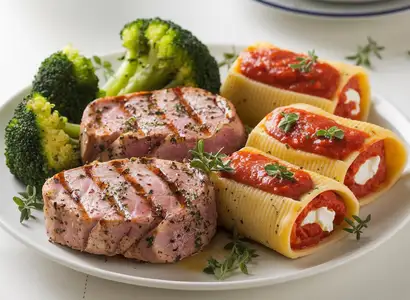
Day 7
Breakfast:
- Savory Dutch Baby with Arugula & Parmesan: Bake a Dutch baby, and top it with arugula and Parmesan. (1 cup flour, 1/2 cup milk, 2 eggs, 1/4 cup arugula, 2 tbsp Parmesan)
Lunch:
- Salmon Croquettes with Dill Sauce: Mix salmon, breadcrumbs, and eggs, form into patties, and fry. Serve with dill sauce. (4 oz salmon, 1/4 cup breadcrumbs, 1 egg, 2 tbsp dill sauce)
- Farro Vegetable Salad: Toss cooked farro with roasted vegetables and feta cheese. (1 cup farro, 1 cup roasted vegetables, 1/4 cup feta cheese)
Dinner:
- Grilled Tuna Steaks: Grill tuna steaks and serve with a side of steamed broccoli. (4 oz tuna, 1 cup broccoli)
- Stuffed Manicotti Pasta Shells: Fill manicotti pasta with ricotta and cabbage, and bake with marinara sauce. (4 manicotti shells, 1/2 cup ricotta, 1/2 cup cabbage, 1/2 cup marinara sauce)
Snacks:
- Roasted Almonds with Smoked Paprika: Enjoy a handful of roasted almonds sprinkled with smoked paprika for a savory twist. (1 oz roasted almonds, 1/4 tsp smoked paprika)
- Orange and Coconut Flakes: Pair orange segments with a sprinkle of unsweetened coconut flakes for a tropical flavor. (1 large orange, 2 tbsp unsweetened coconut flakes)
Best Foods for Osteoporosis
When it comes to an osteoporosis diet, we want to focus on foods that are rich in calcium, vitamin D, magnesium, vitamin K, and protein.
Some of the best calcium foods for osteoporosis include:
1. Dairy Products
- Low-Fat Plain Yogurt: 1 cup (245 g): 415 mg calcium
- Parmesan Cheese: 1 ounce (28 g): 330 mg calcium
- Whole Milk or Skimmed Milk: 1 cup (240 mL): 300 mg calcium
- Greek Yogurt: 1 cup (245 g): 250 mg calcium
- Cheddar Cheese: 1 ounce (28 g): 200 mg calcium
- Low-Fat Cottage Cheese: 1 cup (226 g): 140 mg calcium
2. Fortified Foods
- Calcium-Fortified Orange Juice: 1 cup (240 mL): 350 mg calcium
- Fortified Almond Milk, Soy Milk, or Rice Milk: 1 cup (240 mL): 300 mg calcium
- Calcium-Fortified Tofu: 1/2 cup (126 g): 250-800 mg calcium
- Fortified Breakfast Cereals: 1 serving (1 oz or 30 g): 100-1,000 mg calcium
3. Leafy Green Vegetables
- Turnip Greens (Cooked): 1 cup (144 g): 200 mg calcium
- Dandelion Greens (Cooked): 1 cup (145 g): 187 mg calcium
- Kale (Cooked): 1 cup (130 g): 180 mg calcium
- Bok Choy (Cooked): 1 cup (170 g): 160 mg calcium
- Okra (Cooked): 1 cup (100 g): 123 mg calcium
- Mustard Greens (Cooked): 1 cup (140 g): 118 mg calcium
- Artichokes (Cooked): 1 medium (120 g): 60 mg calcium
- Broccoli: 1 cup (91 g): 43 mg calcium
- Cabbage: 1 cup (89 g): 36 mg calcium
4. Root Vegetables
- Sweet Potatoes (Cooked): 1 cup (200 g): 40 mg calcium
- Potatoes: 1 medium (213 g): 20 mg calcium
5. Fish and Seafood
- Canned Sardines (With Bones): 3 ounces (85 g): 325 mg calcium
- Canned Salmon (With Bones): 3 ounces (85 g): 180 mg calcium
- Shrimp: 3 ounces (85 g): 125 mg calcium
6. Protein Rich Foods
- Tofu (Calcium-Set): 1/2 cup (126 g): 250-800 mg calcium
- Tempeh: 1 cup (166 g): 184 mg calcium
- Edamame (Cooked): 1 cup (155 g): 98 mg calcium
- Eggs: 1 large egg: 28 mg calcium
- Lean Ground Beef (Cooked, 85% lean): 3 ounces (100 g): 24 mg calcium
- Peanut Butter: 2 tablespoons (32 g): 18 mg calcium
- Lamb Chops (Cooked): 3 ounces (85 g): 17 mg calcium
- Chicken Breast (Cooked): 3 ounces (100 g): 15 mg calcium
- Duck (Cooked): 3 ounces (85 g): 13 mg calcium
- Turkey Breast (Cooked): 3 ounces (85 g): 9 mg calcium
7. Nuts and Seeds
- Chia Seeds: 2 tablespoons (28 g): 179 mg calcium
- Tahini (Sesame Seed Paste): 2 tablespoons (32 g): 130 mg calcium
- Unhulled Sesame Seeds: 1 tablespoon (9 g): 88 mg calcium
- Almonds: 1 ounce (28 g): 75 mg calcium
8. Legumes and Pulses
- Black-Eyed Peas (Cooked): 1 cup (172 g): 211 mg calcium
- White Beans (Cooked): 1 cup (179 g): 160 mg calcium
- Chickpeas (Cooked): 1 cup (164 g): 80 mg calcium
- Lentils (Cooked): 1 cup (198 g): 37 mg calcium
9. Fruits
- Dried Figs: 5 figs (40 g): 70 mg calcium
- Oranges: 1 medium (131 g): 60 mg calcium and vitamin C
- Blackberries: 1 cup (144 g): 40 mg calcium
- Papaya: 1 medium (304 g): 37 mg calcium
- Plantains (Cooked): 1 cup (146 g): 32 mg calcium
- Grapefruits: 1 medium (123 g): 28 mg calcium and vitamin C
- Pineapples: 1 cup (165 g): 18 mg calcium and Manganese
10. Grains
- Amaranth (Cooked): 1 cup (246 g): 116 mg calcium
- Quinoa (Cooked): 1 cup (185 g): 31 mg calcium
- Fortified Bread: 1 slice: 100 mg calcium
11. Other Sources
- Blackstrap Molasses: 1 tablespoon (20 g): 170 mg calcium
- Whey Protein (Calcium-Fortified): 1 scoop (30 g): 200 mg calcium
- Dried Kelp (Seaweed): 1 cup (80 g): 136 mg calcium
12. Calcium Rich Herbs
- Dried Basil: 1 tablespoon: 63 mg calcium
- Dried Thyme: 1 tablespoon: 57 mg calcium
- Dried Dill: 1 tablespoon: 53 mg calcium
Worst Foods for Osteoporosis
These foods, especially when consumed in excess, can negatively impact calcium absorption, bone density, and overall bone health.
By limiting or avoiding these foods, individuals with osteoporosis can help improve their bone health and maintain stronger bones over time:
1. Processed and Packaged Foods
- Processed Meats (Hot Dogs, Bacon, Sausages): High in sodium and preservatives, which can increase calcium excretion.
- Frozen Meals: Typically high in sodium, which can lead to calcium loss.
- Canned Soups: Often high in sodium, contributing to bone weakening over time.
- Chips and Snack Foods: Loaded with sodium and unhealthy fats that reduce calcium absorption.
- Instant Noodles: High in sodium and low in nutritional value, leading to calcium depletion.
2. Sugary Foods and Drinks
- Soda (Especially Colas): Contains phosphoric acid, which interferes with calcium absorption and contributes to bone loss.
- Sugary Sweets (Candy, Pastries, Cakes): Excess sugar inhibits the body’s ability to absorb calcium and weakens bones.
- Energy Drinks: High in sugar and caffeine, leading to calcium depletion.
- Sweetened Coffee Drinks: The combination of caffeine and sugar may increase calcium loss.
3. High-Oxalate Vegetables (in Excess)
- Spinach: High in oxalates, which bind to calcium and prevent its absorption.
- Beet Greens: High in oxalates, reducing calcium absorption when consumed in large amounts.
- Rhubarb: Contains oxalic acid, which can interfere with calcium absorption.
4. High-Sodium Foods
- Table Salt (Excessive Use): Too much sodium causes the body to lose calcium, weakening bones.
- Pickles: Often high in sodium, which increases calcium excretion through urine.
- Soy Sauce: High sodium content can lead to calcium loss when consumed frequently.
5. Caffeinated Beverages
- Coffee (Excessive Consumption): Caffeine can decrease calcium absorption and increase calcium excretion. Limit to 2–3 cups per day.
- Tea (Black Tea in Excess): Excessive tea consumption may interfere with calcium retention due to its caffeine content.
- Energy Drinks: High levels of caffeine can accelerate calcium loss from bones.
6. Alcohol
- Beer, Wine, and Spirits: Excessive alcohol consumption reduces bone density and inhibits the body’s ability to produce new bone tissue. Moderation is key.
7. Trans Fats and Hydrogenated Oils
- Margarine: Often contains trans fats that are harmful to overall health, including bone health.
- Deep-Fried Foods: Fried in hydrogenated oils or trans fats, which negatively impact calcium absorption.
- Commercially Baked Goods (Donuts, Cookies, Cakes): Frequently made with hydrogenated oils, reducing bone density.
8. Excessive Protein (Especially from Animal Sources)
- Red Meat (in Excess): High protein diets from animal sources increase calcium excretion when consumed excessively.
- Pork: High in protein and phosphorus, which can negatively affect calcium balance if overconsumed.
- Cheese (Full-Fat Varieties in Excess): While rich in calcium, excessive full-fat cheese increases saturated fat and sodium intake, negatively impacting bones.
9. Excessive Phosphorus-Rich Foods
- Processed Cheese Products (Cheese Whiz, Pre-Sliced Processed Cheese): Contains high levels of phosphorus, disrupting the calcium-phosphorus balance, leading to weaker bones.
- Soft Drinks (Especially Colas): High in phosphorus, which can cause bone mineral loss.
- Organ Meats (Liver, Kidney): High in phosphorus, and excessive intake may throw off calcium balance.
10. Refined Grains
- White Bread: Lacks essential nutrients like calcium and magnesium, which are crucial for bone health.
- White Pasta: Low in calcium and magnesium, providing little nutritional support for bones.
- White Rice: Stripped of nutrients during processing, offering minimal nutritional benefit for bone health.
11. Legumes (in Excess)
- Dried Beans (Kidney Beans, Navy Beans, Black Beans): Contain phytates that reduce calcium absorption. Soaking them or consuming in moderation helps mitigate this.
12. Oxalate-Rich Beverages
- Black Tea (in Excess): High in oxalates, hindering calcium absorption when consumed in large quantities.
- Cocoa: Contains oxalates, which may interfere with calcium absorption.
13. Foods with High Phytic Acid
- Unleavened Bread (E.g., Matzo): High in phytic acid, which binds to calcium, inhibiting its absorption.
- Bran Cereals: Contain phytic acid, reducing the body’s ability to absorb calcium.
14. High Sugar Foods
- Candy Bars: High in refined sugars, interfering with calcium and magnesium absorption.
- Sugary Breakfast Cereals: Low in calcium and magnesium, with high sugar content that hinders calcium absorption.
15. Carbonated Beverages
- Soft Drinks (Colas): High in phosphorus and sugar, contributing to calcium loss and weakened bones.
16. High-Fat Dairy (In Excess)
- Full-Fat Ice Cream: High in fat and sugar, which can reduce bone density and promote weight gain.
- Whole Milk (In Excess): While rich in calcium, excessive full-fat dairy increases saturated fat intake, which may negatively impact overall health.
Diet Tips for People with Osteoporosis
- Calcium is key: Aim for 1000-1200 mg of calcium per day. If you can’t get enough from food, consider a supplement.
- Don’t forget Vitamin D: It helps your body absorb calcium. Aim for 600-800 IU daily. Sunlight exposure can help, but you might need a supplement.
- Protein is important: It helps build and maintain bone. Include a source of protein in each meal.
- Limit sodium: Too much salt can cause your body to lose calcium. Aim for less than 2,300 mg per day. Choose a low sodium diet.
- Stay hydrated: Water is essential for bone health. Aim for 8 glasses a day.
- Moderate your caffeine: Too much caffeine can interfere with calcium absorption. Limit to 2-3 cups of coffee per day.
- Consider fortified foods: If you’re not getting enough nutrients from whole foods, fortified options can help fill the gaps.
- Maintain a healthy weight: Being underweight can increase osteoporosis risk. Pay attention to portion sizes and avoid crash diets and extreme weight loss methods.
- Avoid Excess Alcohol: Keep alcohol consumption to moderate levels (no more than one drink per day for women and two for men) to reduce the risk of bone loss.
Conclusion
Eating a diet rich in calcium, vitamin D, magnesium, and other essential nutrients can help prevent and manage osteoporosis.
This 7 day meal plan for osteoporosis is designed to give your body everything it needs to support bone health, providing a variety of tasty, nutrient-packed bone healthy meals.
Whether you’re looking to prevent osteoporosis or manage it more effectively, these osteoporosis diet recipes and meal ideas are a delicious and easy way to support your bones.
This osteoporosis diet plan is a great start, but don’t hesitate to consult with a healthcare professional or registered dietitian for personalized advice.
- 7-day gallbladder diet plan
- Low cholesterol diet plan
- 7-day insulin resistance diet plan
- 7-day meal plan for anemic people
- Brain health foods
- Mediterranean diet meal plan
- 7-day meal plan for type 2 diabetes
- No sugar diet menu plan
- High protein foods list
- Best foods to lower triglycerides
- Apple cider vinegar diet
- 7-day anti inflammation diet
- Carnivore diet for one month
- Low glycemic index diet plan
- Low carb foods list
- Vegan diet recipes
- Hashimoto diet recipes
- Healthy DASH diet recipes
- Blue Zone recipes
FAQs
Are eggs ok for osteoporosis?
Yes, eggs are generally okay for osteoporosis. They’re a good source of protein and vitamin D, which helps your body absorb calcium, essential for strong bones.
What is the best milk to drink if you have osteoporosis?
The best milk to drink for osteoporosis is fortified plant-based milk like almond milk or soy milk, which often contains added calcium and vitamin D, crucial for bone health.
What drink is good for bone density?
Milk, especially fortified with vitamin D, is an excellent drink for bone density. Additionally, fortified plant-based milks and green smoothies with leafy greens also support bone health.
Is chocolate bad for osteoporosis?
Dark chocolate, in moderation, is fine for osteoporosis, but avoid excessive consumption as it contains oxalates, which can interfere with calcium absorption.
Is peanut butter good for osteoporosis?
Yes, peanut butter contains magnesium, phosphorus, and zinc which are beneficial for bone health. However, it is also high in fat, so it should be eaten in moderation.
What is the best vegetable for osteoporosis?
Turnip greens, kale, dandelion greens, bok choy, and okra are some of the best vegetables for osteoporosis because they’re rich in calcium, magnesium, and vitamin K, which all support bone strength.
